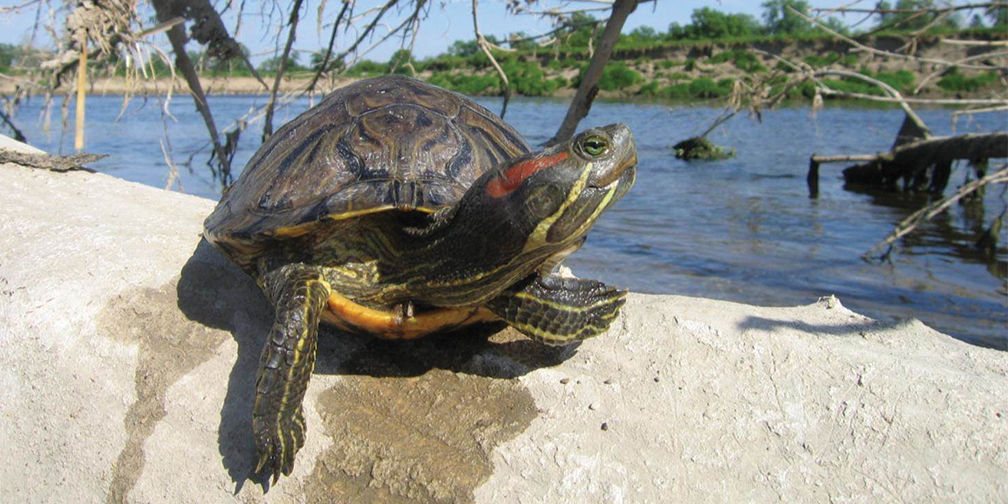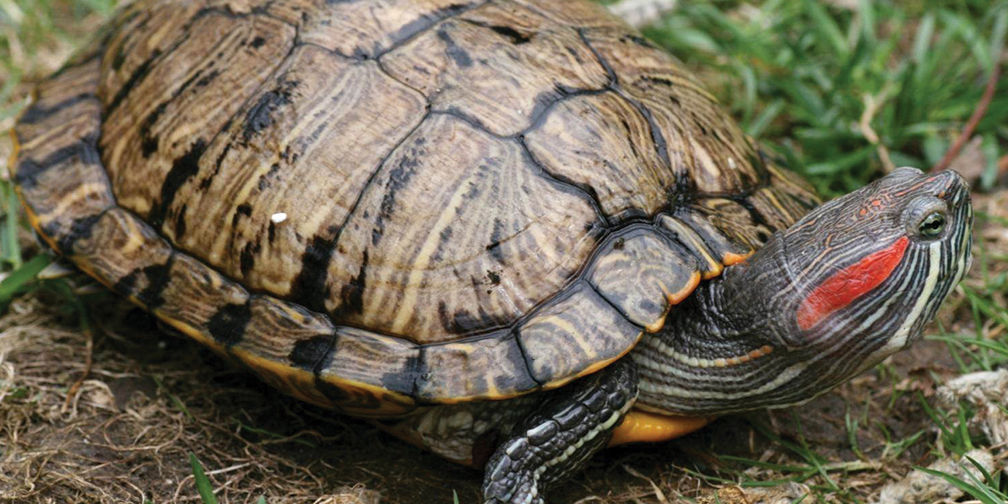Ontario Nature Blog
Receive email alerts about breaking conservation
and environmental news.
© Lora Denis
Red-eared slider © Peter Ferguson
Tiny and adorable red-eared slider hatchlings are frequently bought as pets and then later released “into the wild” when they out-grow their aquariums, or when their owners tire of them. This species is native to southcentral United States and northern Mexico, but – thanks mainly to their release by pet-owners – are now found in many other places, including Canada, Cambodia, China, France, Germany, Greece, Netherlands and Israel.

Scott Gillingwater, Species at Risk biologist with Upper Thames River Conservation Authority in southwest Ontario, is heading a long-term study of released red-eared sliders. With over seven years of data and observations, Scott has determined that sliders are surviving multiple winters, mating and laying eggs in Ontario. In addition, they enjoy a high rate of hatching success for their one or two egg clutches a year.
Scientists are unsure about the long-term impacts these non-native turtles will have on native turtle populations. However, in the short-term, there is a real possibility of released turtles transmitting diseases to native turtle populations. Pet turtles may be diseased, and, if released, may pass diseases onto wild turtles. In the United States, box turtles and tortoises have tested positive for pathogens that can be traced back to captive animals.

Before you purchase a red-eared slider as a pet, consider that they live for 20 – 30 years and attain a length of 30 cm/12 inches. If these facts do not deter you, consider adopting an abandoned red-eared slider instead of purchasing a new one. And if you see red-eared sliders in the wild, report them to the Ontario Reptile and Amphibian Atlas.
Ontario Streams, an environmental NGO, is working with the pet industry to tackle the issue of released red-eared sliders. “Keep. Care. Be Aware.” is their campaign.
Want more info? Here is a video on aquatic invasive species arriving via the pet and pond garden industries.

Gananoque Lake Nature Reserve © Smera Sukumar
Hello, I have 2 turtles that I know longer can take care of but I can’t let them go as I don’t think the will live if I do … so I want to know they are taking care of so would be good if it went to some place that I know there good not some random person that say they will please let me know if there any help on that thank you
Hi Donna, we strongly encourage you to find someone or somewhere to surrender your pet turtles and to emphasize they will likely not survive if released into the wild or that may introduce pathogens to our native species. You can search “Little RES Q”. They take care of surrendered reptiles and rehome them. They have a pretty long wait list for surrenders, but you can apply for a surrender knowing that eventually the turtles will be taken good care of and rehomed through a pretty rigorous adoption process. You could also inquire at Ontario Reptile Rescue and The Toronto Sanctuary.
Yes
My family has rescue cats and we are huge animal lovers and advocates. We are complexly opposed to wild animals in captivity. I’m trying to research the ethics of rescuing a red rated slider turtle. I know nothing about turtles and much of the time I’d rather see an animal euthanized than spend a life in captivity; however, does anyone know whether a RES can live a quality life in a large tank? I know there are many in need of rescuing. Thank you.
Unfortunately their life spans are more like 40-60 years which is part of what makes them such a highly abandoned/released pet. People also don’t realize how much work they are, how smelly they can be and how big they get! They require a minimum of 100 gallons of water plus a place to haul out and sun themselves….. they are really not a great pet for most people.
I’ve had my girl for 20 years this summer but I don’t ever recommend them as pets.
Good work making people aware of this very real invasive species
I turned a large healthy RES over to a biologist here in the state of Connecticut. It was euthanised. In hindsight i would not do that again. What do you do in Ontario?